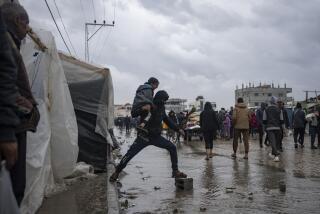At the U.N., Debate Rages Over Taking More -- or Less -- Risk
- Share via
UNITED NATIONS — A debate is simmering within the U.N. about whether efforts to minimize risks for staffers are also jeopardizing the organization’s credibility.
Staff union representatives Wednesday released a letter to Secretary-General Kofi Annan urging that no more staff members be sent to Iraq and that the 32 people recently deployed there to help prepare for January elections be withdrawn as soon as possible.
“Last year, we witnessed the tragic death of 22 colleagues in Baghdad. We do not wish to witness the same again,” said the letter from two unions representing 60,000 U.N. employees. “While [we] are cognizant of the extreme political pressures that you face regarding the role of the U.N. in Iraq, and while we understand that the people of Iraq deserve the support and assistance of the international community, we cannot condone the deployment of U.N. staff to Iraq in view of the unprecedented high level of risk to the safety and security of staff.”
The letter asked why the world body was sending staffers when countries that have been asked for troops to protect the U.N. workers have deemed the environment too risky for their soldiers.
“Just one staff member is one staff member too many in Iraq,” it said.
The suicide bombing of the U.N.’s Baghdad headquarters in August 2003, which killed 22 people, including the gifted and charismatic U.N. chief there, Sergio Vieira de Mello, shattered the organization’s sense of immunity from terrorist attacks and drove home the new reality that the world body’s workers had become targets.
After a second fatal attack a month later, the U.N. in October ordered its international staff members to withdraw from Iraq, and based them in neighboring countries.
A small team of staffers returned to permanent postings in Baghdad in August, starting work just as kidnappings and beheadings were beginning to spread fear among foreigners.
The team is deployed on a rolling basis, and no more than 35 employees are supposed to be in the country at one time under the risk assessment by the U.N. security coordinator.
However, the United Nations has decided that it will need more than 50 people on the ground to help organize the elections.
U.N. spokesman Fred Eckhard said the security team reviewed the situation in Iraq every day.
“We’ve done our work with the Iraqi government and people in organizing the elections, and we will need more than 35 to continue advising them on this process,” he said Wednesday.
“But the current security situation, in the view of the U.N. security coordinator, would not permit raising that ceiling as of today.”
The two unions, umbrella groups for international employees and civil servants, were responding to growing pressure from within and outside the organization to step up the U.N. presence in Iraq.
During the opening of the General Assembly session last month, Iraqi Foreign Minister Hoshyar Zebari bluntly criticized the global organization, saying it was shrinking from its duties. The same week, President Bush asked Annan what kind of help and protection the U.N. would need to send more people.
Even the plan of Massachusetts Sen. John F. Kerry, the Democratic nominee for president, for rebuilding Iraq relies heavily on the U.N. to help pick up the pieces. In Tuesday night’s debate, North Carolina Sen. John Edwards, Kerry’s running mate, noted, “You need more than 35 people to hold an election in Cleveland, much less in Iraq.”
There has been a growing sense of impatience within the U.N. community as well.
Staffers “need to get a grip” and move on, wrote former Canadian Ambassador David Malone in an International Herald Tribune opinion piece. “We don’t need the U.N. in Denmark or Canada. We need it in difficult and often unsafe environments, where absolute security cannot be achieved. This is part of the job.”
The head of the U.N. Development Program, Mark Malloch Brown, sees the new culture of caution as damaging to the world body’s essential mission of providing aid and bearing witness, though he acknowledges that Iraq poses a unique challenge.
“In terms of the risks, I think it’s time to get back,” he said. “We can’t go back while we remain a deliberate target. It’s more than the loss of a single UNDP worker. The whole Iraq reconstruction effort would be stalled because we would be such high-profile kidnap or assassinations victims.”
More to Read
Sign up for Essential California
The most important California stories and recommendations in your inbox every morning.
You may occasionally receive promotional content from the Los Angeles Times.










